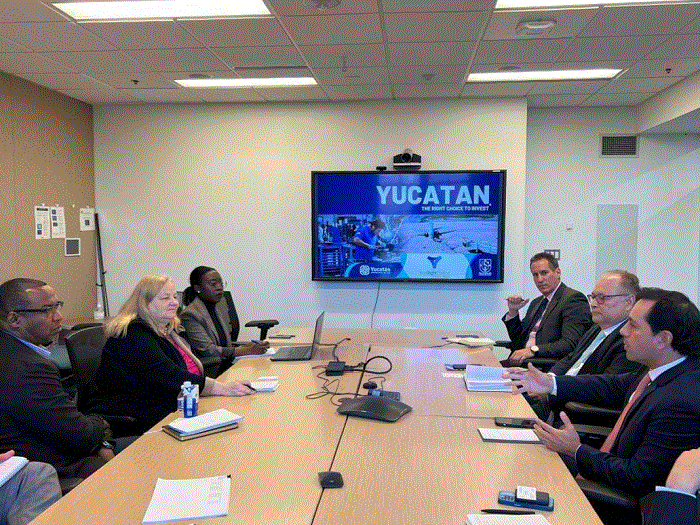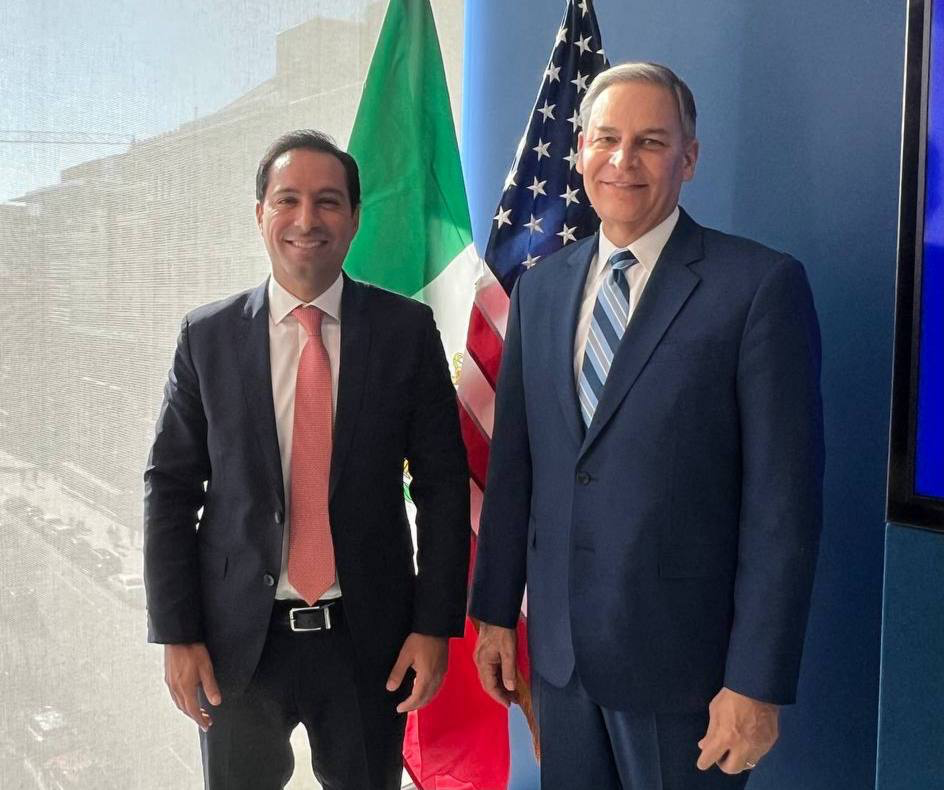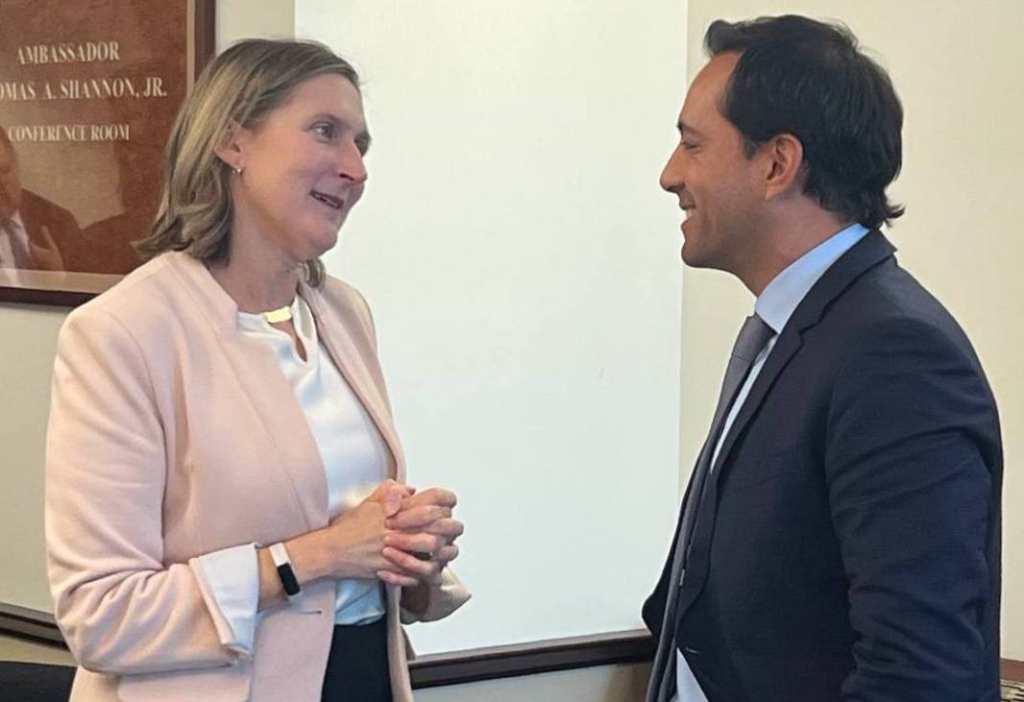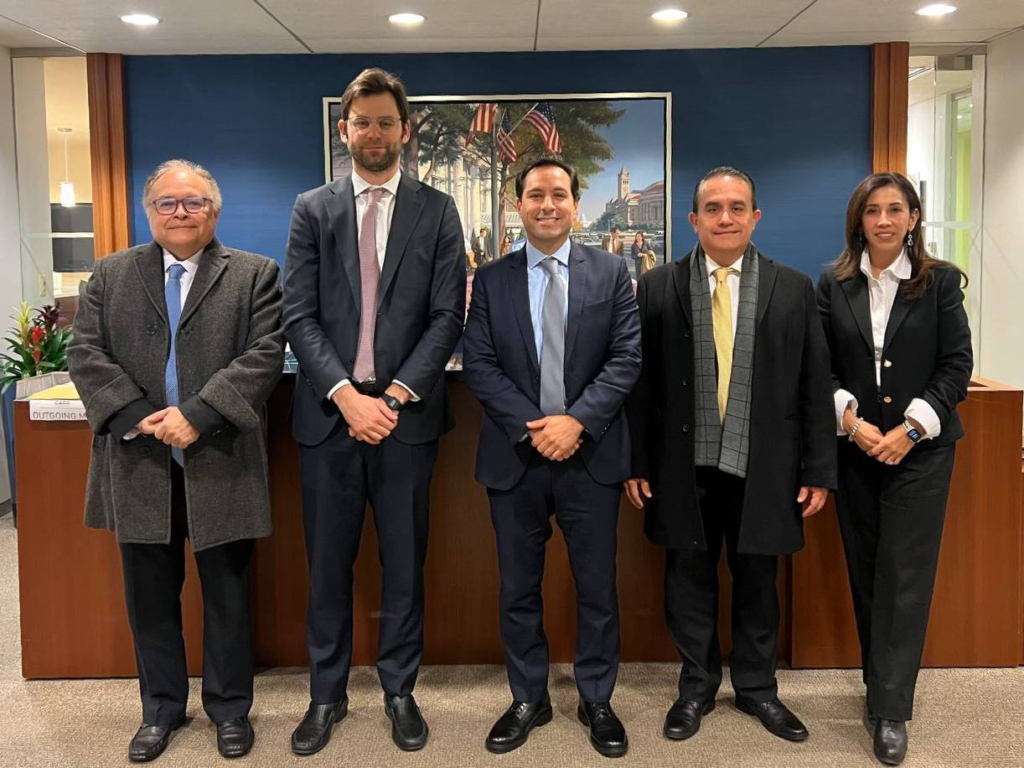To continue the search for new projects and investments that bring more and better jobs to Yucatán for Yucatecans, as well as strategies to make it a more sustainable state, Governor Mauricio Vila Dosal presented to US businessmen and government representatives the competitive advantages of the territory in matters of industry, logistics, security, nearshoring, sustainability, trained human talent and educational training.
As part of his second day of a trade mission in Washington DC, the Governor met with David Zabludovsky, representative of INDEX USA and the Business Coordinating Council (CCE) of Washington, who expressed the interest of US companies in nearshoring with Mexico, as well as issues in semiconductors, customs policies and training for the people of Mexico in priority sectors for North American companies.
In the presence of Laura Martínez, senior advisor of Index USA, and Sergio Gómez Lora, CEO of the CCE office in Washington, Vila Dosal presented the commercial and industrial, logistical, infrastructure, human capital, and security advantages that the state offers to be able to host companies from this country, which translate into attracting more, better-paying jobs for Yucatecans.
Together with the president of the CCE of Yucatán, Alejandro Guerrero, the Governor highlighted that the above is something that has already been done through important infrastructure projects, as well as energy sustainability, which have led Yucatán to be placed in third place in entities in Mexico that have best-taken advantage of nearshoring, through the improvement of their logistics, according to data from the consulting firm Credit Suisse.
He stressed that Yucatán is experiencing a historic moment since 2021 was the year with the most economic growth in history and that same year was when the most jobs were generated with 28,890, according to the Mexican Social Security Institute (IMSS) and also that 2022 is the year with the highest foreign investment; It was also the one that received the most tourists in the territory and the safest, with the lowest crime incidence according to data from the Executive Secretariat of the National Public Security System (SESNSP).
In his presentation, Vila Dosal recalled that to keep Yucatán better connected, they are working on projects such as the expansion of the Mérida International Airport to increase its capacity from 2 to 4.7 million visitors.
Continuing on this second day of the working tour of Washington, the Governor, together with the Yucatan delegation, visited the Department of Commerce of the United States Government, where they were received by the executive director Diane Jones, David Olsen, official for Mexico, Chris Herman, in charge of Renewable Energies and Manuel González, economist for the semiconductor industry. At this meeting, Vila Dosal presented the infrastructure projects being developed in the state, such as the expansion of the Progreso High Port and the construction of the 2 Combined Cycle plants, Mérida IV and Valladolid.
Right there, the Governor spoke about the efforts he is making with the federal government so that the tax incentives that are applied in the strategically controlled areas of the trans-isthmus corridor are also applied in the technological well-being pole of Yucatán.
Regarding the Mayan Train, which will promote economic development through tourism, the Governor recalled that as it is also a freight train that will be connected to the Transisthmian train project, it will allow raw materials to arrive through Salina Cruz, be transformed, reach Yucatán and later leave through Puerto Progreso.
As part of his working tour of this American city, the Governor held a meeting with Jay Timmons, number one of the National Manufacturing Association, and Ken Mohanan, vice president of International Economic Affairs of the organization that houses 14 thousand companies and 13 million jobs in the American union. They recognized the work that Yucatán has done to be one of the leaders in nearshoring.
On this day, Vila Dosal also met with the Deputy Undersecretary for Mexico and Canada of the United States Department of State, Rachel Poynter, with whom he addressed topics such as the development of semiconductors, technologies, climate change, trained human talent, logistics, and imports. , in addition to collaboration with the Agency for International Development (USAID, by its name in English).
In educational matters, Vila Dosal recalled that through the State English Agenda, the mastery of this language is promoted with bilingual environments from preschool to university; With the International Mobility Program, students are prepared to practice the language at prestigious universities in Canada and the United States. In addition, she said, all women who wish to study any engineering career linked to Information Technology in public universities of the State Government will receive a 100% scholarship in registration and tuition throughout their career.
Accompanied by the head of the Ministry of Economic Development and Labor (Sefoet), Ernesto Herrera Novelo, the Governor added that Yucatán has new industry 4.0 and 5.0 laboratories at the Polytechnic Universities of Yucatán (UPY) and Metropolitan Technology Universities (UTM), so that young people can train in the field of the aerospace industry, the supply chain and storage; We were also the first to start Cybersecurity careers in the Southeast, in addition to the creation of 2 new laboratories in collaboration with said study houses, with exclusive design for real-time attack and defense simulation, hacking tests and software vulnerability.
Before, Mileydi Guilarte, deputy administrator for Latin America and the Caribbean of USAID, the leadership that Yucatán has had in terms of sustainability was recognized, and possible opportunities for collaboration between both governments were explored.
Here, the Governor highlighted that in Yucatán they are working with special projects to preserve our reserves and protected natural areas and be able to guarantee the possibility of maintaining the recharge of the aquifer at current levels, while at the same time schemes are being implemented for better management of this resource in the countryside, pollution is being prevented through less waste management and treatment, as well as the construction of bathrooms with biodigesters.
TYT Newsroom





